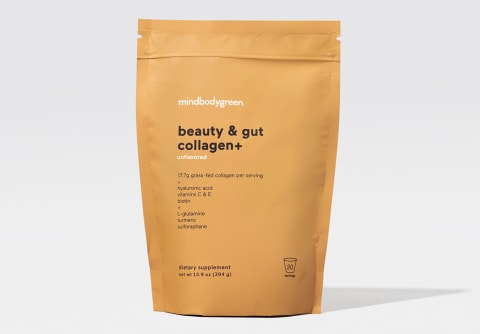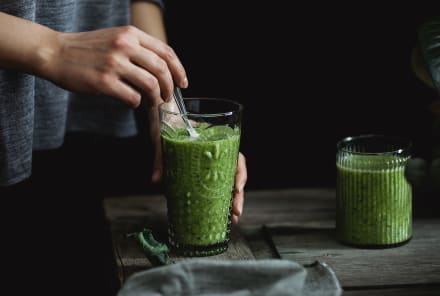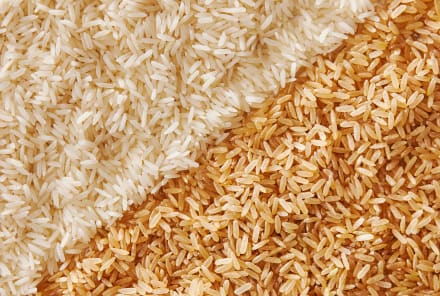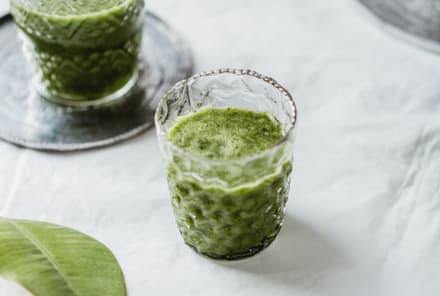Advertisement
5 Science-Backed Ways Collagen Can Support Your Workout


Though collagen is known for its skin care benefits, it looks promising for exercise too.* The protein gives structure to many connective tissues like the bones, tendons, and ligaments.* These body parts are precisely what helps you squat, stretch, and everything in between. So is increasing your collagen intake what your regimen needs? Here are five reasons it may be helpful:
It may support exercise recovery.*
Post-exercise recovery1 is a critical part of a successful workout routine. Not only does recovery let your tissues repair2 and grow, but it reduces the risk of injury too. And when it comes to optimal recovery, collagen may play a role.*
"Collagen has the potential to support recovery because it exerts an anabolic effect on cartilage tissue, which promotes healthy muscle growth,"* notes Caleb Backe, a certified personal trainer. Specifically, collagen peptides send signals that trigger anabolism3 (growth and building) in various tissues—including the skeletal muscle—which could support repair and strength.*
It might manage exercise-related pain.*
No pain, no gain, right? Well, sometimes. Overuse-related pain—which often affects active people—can seriously hinder your exercise goals. And though fitness progress isn't possible without some discomfort, it's still essential to listen to your body and take regular breaks. (But if your pain is severe or doesn't go away, visit the doctor. You might be dealing with a more serious injury.)
In one 2008 study, collagen supplementation helped manage exercise-related joint pain4 in a group of physically active individuals.* A more recent study found that daily intake of collagen peptides moderately helped manage muscle soreness5 after jumping exercises, suggesting it might aid in overall athletic performance.*
It could support bone health.*
Whether you're blasting through pushups or walking up the stairs, healthy bones allow you to move with ease. And as it turns out, collagen might contribute to overall bone health. In a human study, collagen peptides helped manage bone degradation7 in postmenopausal women with age-related bone loss.* A lab study also found that bovine collagen can support osteoblasts8, or bone-forming cell and overall bone health.*
Here's the thing: As we get older, our bodies stop building bone. Instead, the opposite happens, and "bone density naturally decreases over time," says Backe. This increases your risk for osteoporosis, making you more prone to fractures and breaks. "From early adulthood and onward, it's all about preventing and maintaining what you have," adds Lindsey Kane, R.D.
Exercise is undoubtedly one of the best ways to do this. However, encouraging bone health by consuming essential nutrients—like collagen—could also help your bones function safely during exercise.*
It also helps your circulatory system stay healthy.*
Did you know that your blood vessels need collagen, too? This includes your arteries, which are blood vessels that deliver oxygen-rich blood away from the heart. "Collagen provides structure in your arteries9, allowing blood to travel from your heart to the body with ease," says Backe. "For this reason, collagen is crucial in supporting a healthy functional heart9."*
With healthy natural collagen levels, your arteries are less likely to become fragile. "In terms of exercise, this ensures your muscles are receiving enough nutrients and oxygen10 throughout your workout," notes Backe.
It can promote healing after an injury or surgery.*
An injury or surgery can seriously hinder your workout flow. And while it might be frustrating to pause your routine, it's also important to help your body heal. In most cases, this involves lots of rest and a well-rounded diet.
While you're at it, check in with your collagen-supporting nutrients. Results from a lab study11 suggest that vitamin-C-rich gelatin could support tissue repair (along with injury prevention).* And according to Liz Wyosnick, M.S., RDN, foods or supplements containing collagen—along with collagen-boosting nutrients like vitamin C—can be beneficial when you're healing from a surgery or injury of the bone, skin, or ligament.*
During the healing process, "the body is in a high metabolic state and protein needs increase," explains Wyosnick. Enter collagen-containing foods, which can help you meet these protein requirements. Just remember, collagen by itself isn't a complete protein, so supplements shouldn't replace your post-workout protein source, says Wyosnick.
The bottom line:
Adding collagen supplements to your well-balanced diet can offer a host of benefits from skin and hair to, yes, workouts, too.* This is because collagen gives your body the nutrients it needs to function optimally; its amino acid profile supports connective tissues, muscles, circulatory system health, and injury recovery.*
11 Sources
- https://www.ncbi.nlm.nih.gov/pubmed/28702900
- https://www.ncbi.nlm.nih.gov/pmc/articles/PMC5932411/
- https://www.ncbi.nlm.nih.gov/pmc/articles/PMC6521629/
- https://www.ncbi.nlm.nih.gov/pubmed/18416885?dopt=Abstract
- https://www.ncbi.nlm.nih.gov/pubmed/30783776
- https://www.ncbi.nlm.nih.gov/pubmed/28177710/
- https://www.ncbi.nlm.nih.gov/pmc/articles/PMC5793325/
- https://www.ncbi.nlm.nih.gov/pubmed/31975417
- https://www.ncbi.nlm.nih.gov/books/NBK21582/
- https://www.ncbi.nlm.nih.gov/pmc/articles/PMC4818249/
- https://www.ncbi.nlm.nih.gov/pmc/articles/PMC5183725/
Watch Next
Enjoy some of our favorite clips from classes
Enjoy some of our favorite clips from classes
What Is Meditation?
Mindfulness/Spirituality | Light Watkins
Box Breathing
Mindfulness/Spirituality | Gwen Dittmar
What Breathwork Can Address
Mindfulness/Spirituality | Gwen Dittmar
The 8 Limbs of Yoga - What is Asana?
Yoga | Caley Alyssa
Two Standing Postures to Open Up Tight Hips
Yoga | Caley Alyssa
How Plants Can Optimize Athletic Performance
Nutrition | Rich Roll
What to Eat Before a Workout
Nutrition | Rich Roll
How Ayurveda Helps Us Navigate Modern Life
Nutrition | Sahara Rose
Messages About Love & Relationships
Love & Relationships | Esther Perel
Love Languages
Love & Relationships | Esther Perel












